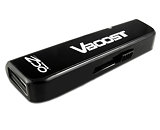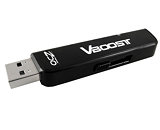Tuesday, May 1st 2007

OCZ Unleashes the VBoost USB 2.0 Flash Drive Family Designed for Windows Vista ReadyBoost
OCZ Technology Group, today announced an exciting new addition to its award-winning lineup of flash drives. VBoost USB 2.0 Flash Drives are optimized for Windows Vista ReadyBoost. Vista ReadyBoost enables the OCZ VBoost to double as supplemental cache memory for faster retrieval and storage of system data and applications. By providing an instant supply of additional memory, this drive is a cost-effective alternative to expensive RAM upgrades.As Microsoft's next generation operating system, Vista has many new features that enhance the experience of users accustomed to XP's look and feel. As consumers make the switch to Vista, it is beneficial for users to expand on compatible accessories and take full advantage of what Vista has to offer. Here the VBoost prevails, not only by acting as a high-capacity storage device, but by supporting ReadyBoost to impact application loading and closing time.
"OCZ is pleased to release the sleek and cap-less VBoost USB drive, which is designed not only to be an exceptional USB flash drive but also for consumers looking to take advantage of the benefits of ReadyBoost," said Alex Mei, Executive VP of OCZ Technology Group. "The VBoost drive is optimized for fast easy access and increases system performance when paired with the Microsoft Windows Vista ReadyBoost feature."
Unlike flash drives with easy-to-lose caps, the VBoost features a retractable USB key that is unsheathed it from its housing with the click of a switch. Typical removable caps may get lost and leave the connector plug exposed to possible damage, but the VBoost design eliminates the possibility of losing the cap along with providing protection. Like all OCZ flash drives, portability and size is a defining factor; users are able to operate adjacent USB ports without needing to unplug other peripherals.
The VBoost flash drive is available in 1GB, 2GB, and 4GB capacities to truly personalize the size needed for maximum ReadyBoost execution and desired increase in system responsiveness. Although OCZ offers a full line of upgrade memory modules for Vista desktops, the VBoost flash drive family is an effective stand-in and is backed by a 3 year warranty for ultimate peace of mind.
For more information on the VBoost Flash Drive, please click here.
Source:
OCZ Technology
"OCZ is pleased to release the sleek and cap-less VBoost USB drive, which is designed not only to be an exceptional USB flash drive but also for consumers looking to take advantage of the benefits of ReadyBoost," said Alex Mei, Executive VP of OCZ Technology Group. "The VBoost drive is optimized for fast easy access and increases system performance when paired with the Microsoft Windows Vista ReadyBoost feature."
Unlike flash drives with easy-to-lose caps, the VBoost features a retractable USB key that is unsheathed it from its housing with the click of a switch. Typical removable caps may get lost and leave the connector plug exposed to possible damage, but the VBoost design eliminates the possibility of losing the cap along with providing protection. Like all OCZ flash drives, portability and size is a defining factor; users are able to operate adjacent USB ports without needing to unplug other peripherals.
The VBoost flash drive is available in 1GB, 2GB, and 4GB capacities to truly personalize the size needed for maximum ReadyBoost execution and desired increase in system responsiveness. Although OCZ offers a full line of upgrade memory modules for Vista desktops, the VBoost flash drive family is an effective stand-in and is backed by a 3 year warranty for ultimate peace of mind.
For more information on the VBoost Flash Drive, please click here.


10 Comments on OCZ Unleashes the VBoost USB 2.0 Flash Drive Family Designed for Windows Vista ReadyBoost
But, today RAM is quite cheap. If you have a choice to add 1GB, go for RAM for better performance.
Best regards,
Arto.
Seriously, using a USB stick to speed up an OS in some way? Yes, I agree, it's clever (and a little neat), but is Vista so slow normally that such an ugly hack as this is needed?
the whole idea seems still seems like an ugly hack, though -- it'd make more sense to me to just get (and use) more RAM.
would it be worth while to use a 512 mb usb stick? I just got one to flash my video bios and have no real use for it now.
Just helps alleviate HD chugging.